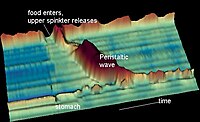
Photo from wikipedia
A comparative study of the moisture content, mobility of water protons and retrogradation process in muffin samples with the addition of extruded (ME) flour (10%) during storage (14 days) was carried… Click to show full abstract
A comparative study of the moisture content, mobility of water protons and retrogradation process in muffin samples with the addition of extruded (ME) flour (10%) during storage (14 days) was carried out and compared to control samples without the addition (MO). A significant increase in water content during swelling of the extruded flour was found. The proton magnetic relaxation signal for both ME and MO showed a two-component character for the fast-decay region (free induction decay, FID experiment) and a three-component character for the slow-decay (CPMG experiment) one. The relaxation times T 2 characterizing the protons of both water and non-aqueous fraction decreased during the experiment except for the protons of the fat fraction. The values of relaxation times T 2 for ME exceeded the values for MO, which reflects the increased water content in ME. The amplitude of the signal of water protons (two components of CPMG) decreased for ME more slowly (by about 3–5 days), which can serve as a characterization the shelf life of the muffins. Estimation of the retrogradation rate according to the Avrami model showed a lower value of the rate for ME compared to MO, which may reflect the increased moisture content in ME.
Journal Title: Journal of Food Science and Technology
Year Published: 2020
Link to full text (if available)
Share on Social Media: Sign Up to like & get
recommendations!